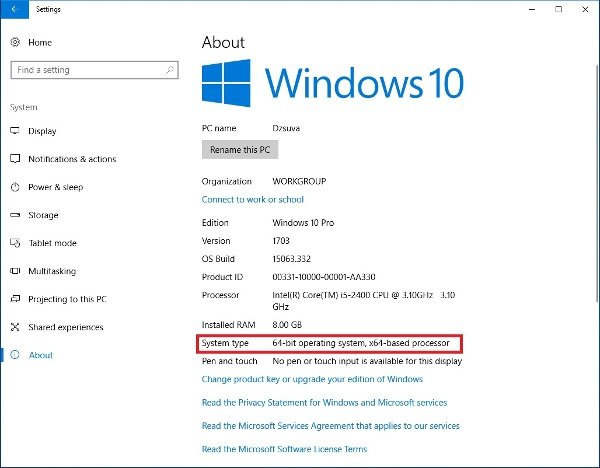No doubt, Windows 10 is one of the most reliable and widely used operating systems across the globe at present. Microsoft had designed the operating system variant to be operational on both 32-bit and 64-bit architecture. Well, one might not be able to find basic differences between these two different architectures, but there are some definite distinguishable features.
However, the news might appear shocking to you if you’re one of the users who have installed Windows 10 on the system. Microsoft has currently stopped offering 32-bit Windows 10 versions to PC manufacturers. The instant implication of this act might indicate that Microsoft wants the 32-bit era to come to an end. In case you own a 32-bit Windows 10 PC, then the information might have frightened you. Let’s find out the whereabouts and further implications of the fact.
Do Current 32-bit Users Need to Worry?
According to experts of Microsoft Surface Repair, the 32-bit version of Windows 10 is not going to be wiped out from your PC. So, if you have a PC with a 32-bit Windows 10 operating system, then you need not panic. Well, we can assure you that until Microsoft makes any further announcements regarding the 32-bit version, you can rely on it.
 However, Microsoft has stated that it will discontinue offering that particular version of Windows 10 to any PC maker. Adding to this, the authority has cleared that they will keep updating the operating system with every kind of security patch required. On the other hand, Microsoft would sell the operating system directly to the consumers rather than via any PC manufacturers.
However, Microsoft has stated that it will discontinue offering that particular version of Windows 10 to any PC maker. Adding to this, the authority has cleared that they will keep updating the operating system with every kind of security patch required. On the other hand, Microsoft would sell the operating system directly to the consumers rather than via any PC manufacturers.
If you are still using the 32-bit Windows 10 version, you should better upgrade the components. This is practically a weaker version, and you might face countless limitations in the near future.
New PCs are Expected to have 64-bit Windows 10
Microsoft has confirmed that it would not supply 32-bit Windows 10 operating systems to computer manufacturers. However, Microsoft hasn’t commented on the 64-bit Windows 10 operating system version. It interprets that we are going to experience new computers to come up with the 64-bit Windows 10 primarily.
 The processor manufacturers would design and develop chips that would support the 64-bit Windows 10 version. The 32-bit CPU processors are going to be extinct, gradually. Well, Microsoft might be following the footsteps of Google.
The processor manufacturers would design and develop chips that would support the 64-bit Windows 10 version. The 32-bit CPU processors are going to be extinct, gradually. Well, Microsoft might be following the footsteps of Google.
Google declared that it would not host 32-bit applications on the Play Store in January 2020. And, it seems to be effective from the beginning of 2021. Similarly, Microsoft decides to quit the support for 32-bit Windows 10 and introduce the 64-bit system as the basic ecosystem for PCs. Apple also restricted the support for 32-bit applications on macOS Catalina in 2020.
Well, Microsoft recently released the hardware requirements for Windows 10 version 2004. As discovered by Neowin, the requirements clearly stated that every new Windows 10 system is going to require the hardware that supports 64-bit builds. Additionally, Microsoft won’t release 32-bit Windows 10 for OEM distribution purposes.
Why did Microsoft come up with Such a Move?
Well, this news might sound uncommon but not unexpected. Microsoft or any leading companies are advancing according to the dynamic movement of technology. If we peek into last year’s Microsoft activities, it came up with a similar trend. The storage amount was almost doubled for Windows 10 PCs.
Specifically, 32-bit Windows 10 PCs can acquire storage of 16GB. And, when it comes to 64-bit, then the storage might vary between 20GB and 32GB. Microsoft didn’t mention that devices with a 32-bit build are bound to have almost a RAM of 3.5GB.
 As Windows 10 is updating and improving its performance day by day, the memory address requirements might be too low to handle all the performances. PCs having a RAM of 4GB would face many difficulties with Windows 10 updates and functionalities.
As Windows 10 is updating and improving its performance day by day, the memory address requirements might be too low to handle all the performances. PCs having a RAM of 4GB would face many difficulties with Windows 10 updates and functionalities.
The minimum RAM requirement should be around 6GB or 8GB. Otherwise, the system might have issues with swapping data to the disk drive, increasing the workload. And, you will experience a delay in tasks if sufficient amounts of RAM are not available to manage them.
That’s why Microsoft has taken the initiative to upgrade the minimum support to 64-bit processors. That’s why it is gradually increasing its capacities, and it stops releasing 32-bit Windows 10 versions to PC manufacturers. Existing 32-bit builds would operate until they became incompatible.
Difference between 32-bit and 64-bit Builds or Operating Systems
There’s a fine line between the systems with 32-bit support and 64-bit support. When it comes to a 32-bit system, the device is capable of handling 2^32 memory addresses. So, it would require a physical or main memory of 4GB; where the physical memory is similar to RAM. However, the system is capable of handling RAM greater than 4GB, as well.
 On the other hand, a system with a 64-bit build can tackle 2^64 memory addresses. Considering a 64-bit system, the device is going to require more than 4GB of RAM. Ideally, a RAM of 8GB can easily tackle the 64-bit systems.
On the other hand, a system with a 64-bit build can tackle 2^64 memory addresses. Considering a 64-bit system, the device is going to require more than 4GB of RAM. Ideally, a RAM of 8GB can easily tackle the 64-bit systems.
Or else, the CPU can’t access sufficient memory, and the memory resources remain inaccessible. Well, this is a complete waste. It’s a wise decision to go with upgraded RAM capacities if you’re going for 64-bit builds.
Which One Should You Choose?
As you can see, Microsoft is gradually abandoning the use of 32-bit Windows 10, so you should go with 64-bit system builds. In addition to this, these are the following advantages of selecting 64-bit over 32-bit:
- 64-bit systems are preferably made for multitasking. Your system would hardly freeze with 64-bit specifications.
- You can operate highly advanced graphics and modern games on your 64-bit computers.
However, if your computer comes with a 64-bit processor, you can go for a 64-bit or 32-bit operating system. But, you can’t do vice versa. 64-bit programs are not supported on 32-bit systems. Additionally, a 16-bit supported program won’t function on a 64-bit system. But, 32-bit programs might run on 64-bit systems or processors.
Final Verdict….
If you’re working on a PC with a 32-bit processor, then you can either upgrade it to make it compatible with 64-bit Windows 10. Or else, your device might not run efficiently. However, 32-bit Windows 10 is going to be extinct, and you need to adapt to it. The PC manufacturers won’t come up with 32-bit processors as the scenario seems to be. Therefore, upgrading or replacing your PC is the only choice if you’re taking the long-term future into account.








